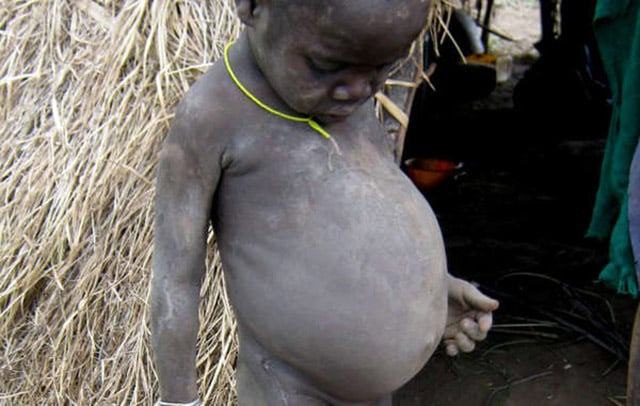
Survival International, the global movement for tribal peoples’ rights, has received disturbing reports that the smallest and most vulnerable tribe in Ethiopia’s Lower Omo Valley is starving, as a result of the destruction of their forest and the slow death of the river on which they depend.
The Kwegu, who number just 1,000, hunt, fish and grow crops along the banks of the Omo River. But the massive Gibe III dam and associated large-scale irrigation for commercial plantations on tribal land will stop the Omo River’s floods, and destroy the fish stocks on which the Kwegu depend. Recent satellite images show that the Ethiopian government has started to fill the Gibe III dam reservoir.
In disturbing video testimonies filmed in 2012 during the clearing of their land, a Kwegu man said, “Maybe we will die. The river keeps us alive. If they take the water out of the riverbed where will we live? If the fish are gone what will we feed the children?”
Watch the full video testimonies here (the identity of the tribespeople has been disguised to avoid persecution)
Maybe we will die: Kwegu tribespeople in Ethiopia’s Lower Omo Valley report in 2015 that they are starving as a result of being forced from their land and of the irrigated plantations that are drying up the river on which they depend. These interviews were filmed in 2012, during the clearing of their land for a government sugar plantation.
Many now report that their beehives have been destroyed by the government’s Kuraz sugar plantations and that their sorghum crops along the Omo riverbank have failed because there has been no flood. The Kwegu have become dependent on food from neighboring tribes to survive.
There has been almost no consultation of the indigenous peoples of the Lower Omo Valley about these projects on their land, and resistance is met with brutal force and intimidation. Several tribes are being forcibly settled by the government in a process known as “villagization.”
A member of the Suri, a neighboring people to the Kwegu, told Survival earlier this week, “The government has told us to live in new houses but we don’t want to… They did not try to explain what they were doing or ask us what we wanted.”
Ethiopia is one of the largest recipients of USA, UK and German aid. DfID, the UK’s donor agency, recently announced it will stop funding a program which has been linked to the forced resettlement of tribes. However, it has not reduced the amount of its aid to Ethiopia and makes no reference to the resettlement program.
 The Kwegu’s children are going hungry because of the lack of fish and crops, and have become reliant on food from neighboring tribes. (Photo: Survival International)
The Kwegu’s children are going hungry because of the lack of fish and crops, and have become reliant on food from neighboring tribes. (Photo: Survival International)
A report of a donor mission to the area in August 2014 by the Development Assistance Group – a consortium of the largest donors to Ethiopia including USA, the UK, Germany and the World Bank – has not been released, despite the growing humanitarian crisis in the Lower Omo.
Stephen Corry, Director of Survival, said today, “Donor agencies need to reform to ensure taxpayers’ money is not spent propping up governments responsible for evicting tribal peoples from their lands. DfID says its aid supports the poorest – yet it turns a blind eye to the many reports of human rights abuses in the Lower Omo, and continues to support an oppressive government hell bent on turning self-sufficient tribes into aid-dependent internal refugees.”
Notes to editors:
– DfID’s total aid budget for Ethiopia is £368,424,853 for 2014/2015
– The interviews were filmed in 2012 when the Kuraz Sugar project started clearing Kwegu land.
Trump is silencing political dissent. We appeal for your support.
Progressive nonprofits are the latest target caught in Trump’s crosshairs. With the aim of eliminating political opposition, Trump and his sycophants are working to curb government funding, constrain private foundations, and even cut tax-exempt status from organizations he dislikes.
We’re concerned, because Truthout is not immune to such bad-faith attacks.
We can only resist Trump’s attacks by cultivating a strong base of support. The right-wing mediasphere is funded comfortably by billionaire owners and venture capitalist philanthropists. At Truthout, we have you.
Our fundraising campaign is over, but we fell a bit short and still need your help. Please take a meaningful action in the fight against authoritarianism: make a one-time or monthly donation to Truthout. If you have the means, please dig deep.